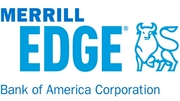Merrill Edge is an online platform owned by the large investment firm Merrill Lynch. Merrill Lynch is currently owned by Bank of America, which makes Merrill Edge a great choice for investors that have accounts with either Merrill Lynch or Bank of America. Investors have access to wealth management and traditional banking via this financial powerhouse.
Merrill Edge is similar to Charles Schwab as it assists customers with banking and wealth management services. This firm also offers generous sign-up bonuses to entice investors to open accounts. For instance, each investor that invests $20,000 will receive an additional $100 and it has tiered bonuses here.
Who a Merrill Edge IRA is best for
Merrill Edge is best for investors that want to work with one of the largest financial institutions. It’s great for investors that want to take advantage of signup bonuses, trade online, work with an advisor all at a low cost. It’s not ideal for investors that want to invest in non-traditional assets. Merrill Edge offers self-directed IRAs but lacks many alternative investments like tax liens and private placements.
Check out our roundup of the Best Self-Directed IRAs
Merrill Edge IRA investment options
This broker offers mostly traditional investment options like:
- Stocks or equities
- Mutual Funds
- ETFs
- Bonds, or fixed income investments
- Stock Options
- Target date funds
Merrill Edge also offers robust trading tools along with financial education resources. Therefore, investors can conduct proper research before selecting an investment that suits their needs. It doesn’t have the wide selection of alternative assets like the other custodians do.
Merrill Edge IRA features
Merrill Edge is one of the more affordable options with low fees for different investment products. Some fees include a standard $6.95 per stock, option or ETF trade. Keep in mind that ETFs along with mutual funds have expense ratios that range from .03-2% annually. It’s best to keep fees low as they can erode nest eggs and even expensive, actively managed funds underperform market indexes like the S&P 500. Therefore, it’s wise to check the fees and performance metrics prior to investing. They also charge an additional $0.75 per options contract and a $19.95 fee for mutual funds in self-directed accounts. There are some mutual funds that are commission free and any funds that carry trading charges have clear upfront disclosures.
Merrill Edge charges trading fees for fixed income products like bonds that range from 0-1$. Many short term debt investments like US treasuries trade commission free. Many bond investors usually purchase “round lots” which represent 100 bonds. Bonds have lower risk and returns, which is why most investors need a large quantity to have a decent profit.
Investors can use both the trading tools, research pieces and even a financial advisor to choose the optimal investments. Be aware that working with a Merrill financial advisor requires additional fees and higher account minimums.
Customer support
Merrill Lynch has great customer support via branches, phone-based and online. As it’s a large firm, it has the resources to answer most questions.
Pros
- Excellent customer support and trading portal.
- Extensive resources via its Bank of America affiliation.
- Access to financial advisors.
- Low fees.
- No self-directed IRA minimum balance.
- Generous signup bonuses.
Cons
- Doesn’t offer non-traditional investments as it focuses on standard options.
- Fees are low, but other firms like Charles Schwab have lower trading fees at $4.95.
- Account minimums and expensive fees for those that want to work with advisors.


